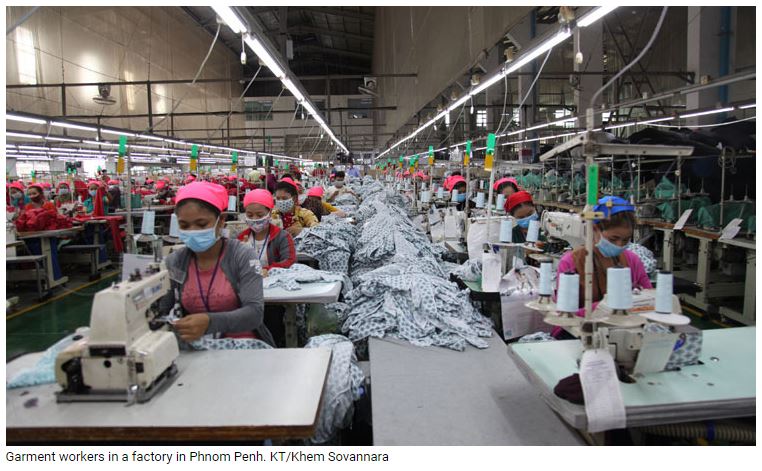Cambodian textile industry ‘needs to develop advanced skillsets’
Cambodia’s textile and apparel (T&A) industry, a key export sector for the country, needs to develop advanced skillsets, both in technical and soft-skill domains, to remain competitive, according to the government’s Industrial Transformation Map for Textile and Apparel Industry 2023-2027.
“Since the 1990s, this sector has been continuously transformed into a growth pillar based on political stability and peace, competitive wage and production cost, preferential trade access and favourable investment environment, all of which have been the industry’s competitive advantage. Overall, this industry has played a key role in Cambodia’s export and supported people’s livelihood of at least 2.5 to 3 million people who have benefitted from this industry,” Minister of Economy and Finance Aun Pornmoniroth said in the report.
Among the several recommendations for developing advanced skillsets for the industry, the roadmap suggested lean manufacturing and the absorption and adoption of the 5S methodology.
“The implementation of lean manufacturing and 5S methodology in production not only contributes to the increase in productivity but also contributes to the efficient and sustainable use of resources. Thus, the government will support the TAFTAC and CGTI to attract experts in lean manufacturing and 5S methodology in production from foreign countries to build the capacity of local experts and talents to promote the absorption and implementation of this new production method across the T&A factories in Cambodia,” the report indicated.
It also proposed strengthening education and TVET institutions. The report stated that improving the infrastructure of education and TVET institutions is essential for effectively developing human capital in the T&A industry.
“Thus, the private sector in T&A industry, in collaboration with the government, needs to build higher advanced technical skills and critical core skills and develop degree apprenticeship programs necessary for high value-added production and more recruitment of local employees to middle-and senior-level management positions,” it said.
The adoption of the cleaner production system is critical to remain competitive in the global market and this needs to be adopted at the firm level as well as industry level with the support of the government, the study pointed out. The industry needs to adopt IR4.0 technologies and invest in R&D.
Some actionable measures suggested include the adoption of resource-efficient cleaner production, sustainability initiatives at the firm level, incentivizing R&D and technology adoption, implementation of machinery leasing mechanisms, and selective and gradual adoption of Industry 4.0.
The report indicated that the government will launch laws, guidelines and minimum compliance levels on social and environmental aspects, in line with other competing countries and the minimum standards set by global brands, after consultation with relevant stakeholders.
The government will also collaborate with international development agencies and industry experts for capacity development measures of institutions and individuals for environmental and social compliance.
The government, development partners, trade bodies, and training institutions will prepare and implement initiatives for resource-efficient cleaner production, in particular, reducing the usage of water, chemicals, and energy and improving resource efficiency by reducing, reusing and recycling.
Regarding sustainability initiatives, the report stated that the government would encourage T&A manufacturers to implement several initiatives and best practices.
Source: https://www.khmertimeskh.com/501283448/cambodian-textile-industry-needs-to-develop-advanced-skillsets/


 Thailand
Thailand




